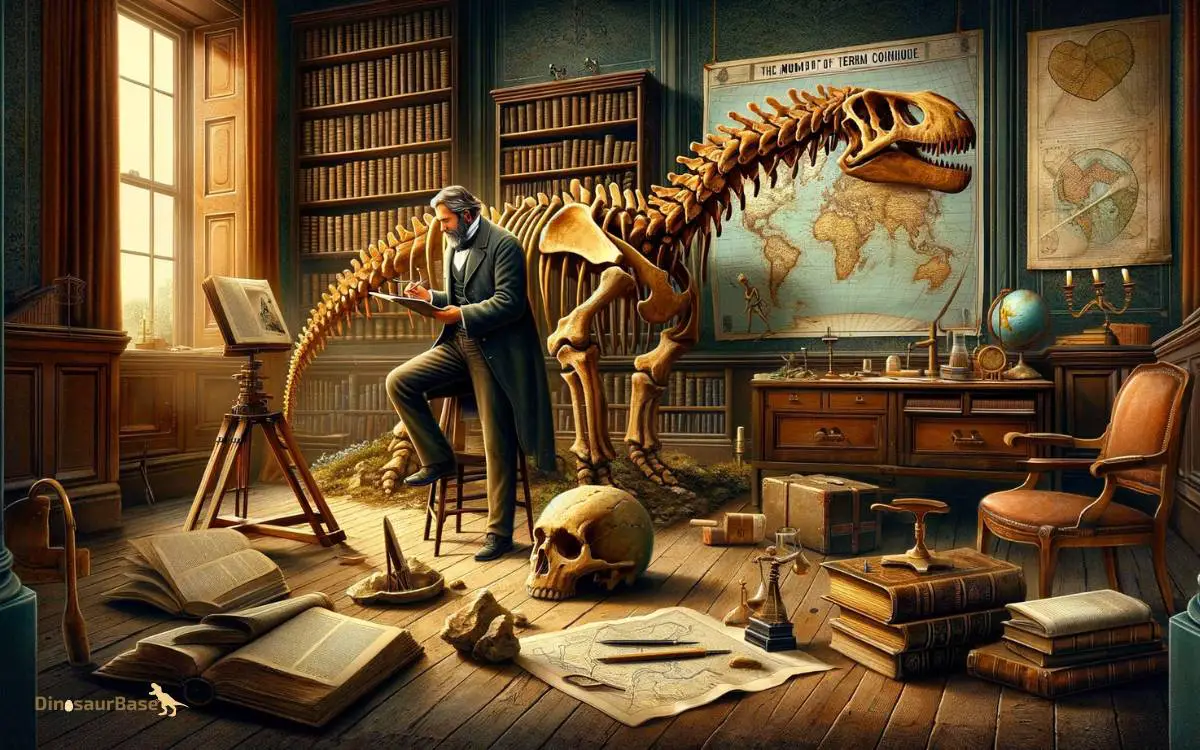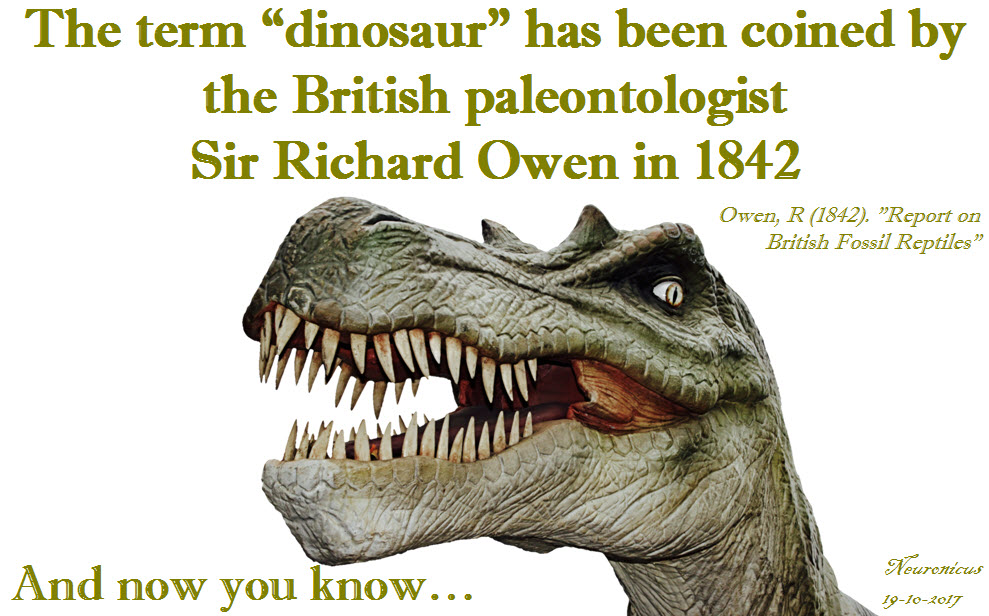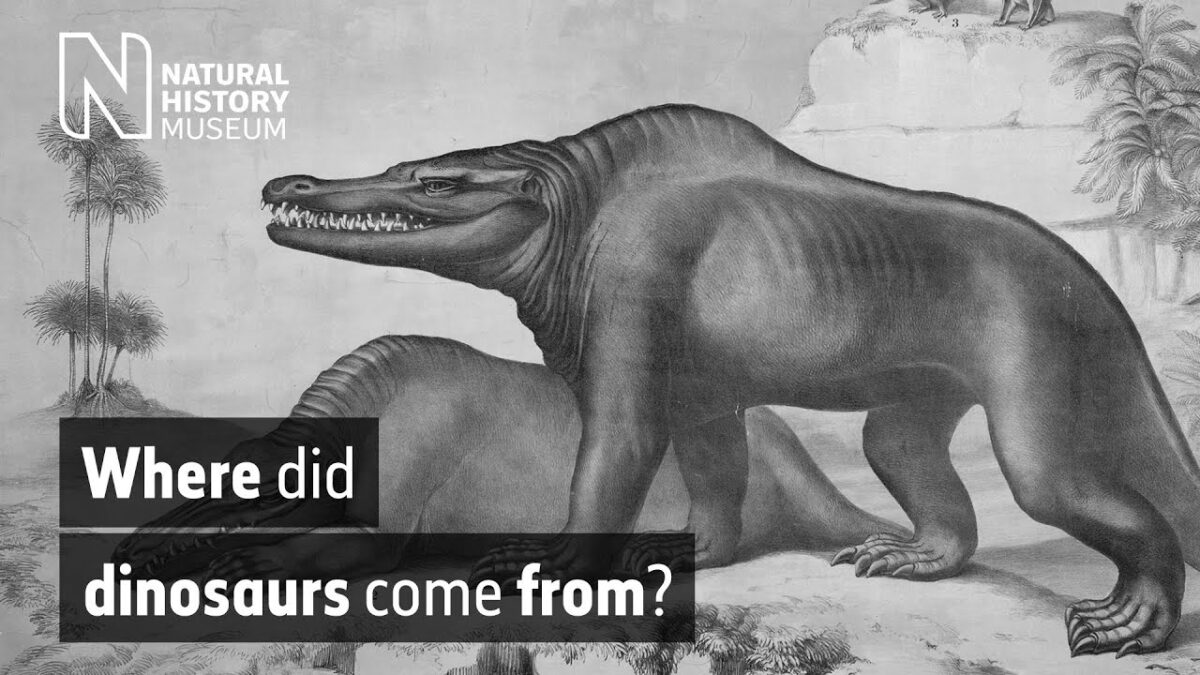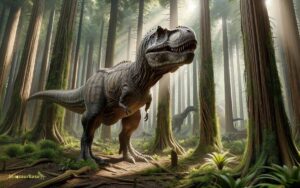How to Understand Who Coined the Term Dinosaur
The term “dinosaur” was coined by Sir Richard Owen in 1842. Owen was a British paleontologist and anatomist.
Understanding who first named the dinosaurs opens a window into the history of paleontology. Sir Richard Owen stands as a seminal figure, who not only introduced the term but also set the foundation for extensive research into these prehistoric creatures.
His work revolutionized the way we perceive these ancient reptiles, distinguishing them from other reptilian groups of the time.
Recognizing his contribution is crucial for enthusiasts and scholars alike, as it marks the starting point of the science that studies dinosaurs.
Embracing this historical milestone enhances appreciation for the evolutionary narrative of life on Earth and underpins the significance of taxonomy in understanding the natural world.

Origins Of The Word ‘dinosaur’

Credit: scientiaportal.wordpress.com
The term ‘dinosaur’ has fascinated people for generations. Its origin story is as intriguing as the creatures themselves.
Unveiling the roots of this colossal name not only gives us historical context but also highlights the evolution of paleontology.
The Birth Of A New Term
Before the 1800s, no one knew dinosaurs existed. Only when large bones surfaced did the quest begin.
In 1842, a pivotal moment occurred. Sir Richard Owen, a respected British paleontologist, recognized these bones belonged to a new group of extinct reptiles.
Using his expertise, Owen presented a name at the British Association for the Advancement of Science. He wanted this name to reflect their grandeur.
Thus, the world first heard ‘Dinosauria’, translating to ‘terrible lizards’. His proposal connected these ancient creatures under a single term that endures today.
Etymology Of ‘dinosaur’
The word ‘dinosaur’ comes from Greek. It is a blend of two words; ‘deinos’, meaning terrible, and ‘sauros’, meaning lizard. Despite the name, dinosaurs are not modern lizards.
Owen used ‘terrible’ in the sense of awe-inspiring, recognizing dinosaurs’ massive size and strength, not their disposition.
- ‘Deinos’ (Greek): terrible, potent, or fearfully great
- ‘Sauros’ (Greek): lizard or reptile
Owen’s choice showed his insight into their nature, without ever seeing them alive. ‘Dinosaur’ precisely captured their essence and imprinted a lasting legacy on the field of paleontology.

Credit: www.amnh.org
Sir Richard Owen: The Father Of ‘dinosaur’
Sir Richard Owen stands tall in the annals of paleontology. This Victorian scientist made history with a discovery that would captivate imaginations for generations.
Think of giant lizards roaming the Earth, and you’re in Owen’s world of ‘dinosaurs’—a term he crafted himself, shaping the study of prehistoric life.
Owen’s Contributions To Paleontology
Owen’s work went well beyond coining a term. His sharp mind laid the groundwork for modern paleontology. Owen studied fossils with a keen eye, making discoveries about extinct creatures.
He described complex anatomies and connected the dots between ancient and modern species. Owen didn’t just name the dinosaurs; he reshaped our understanding of them.
- Described the first dinosaur fossils with precision.
- Linked living animals to their prehistoric ancestors.
- Developed comparative anatomy techniques.
Coined In 1842: A Historical Context
The year 1842 marks a pivotal moment in scientific history. Owen observed that certain fossils possessed unique features.
These creatures, unlike any living species, had ‘fearfully great lizards’ prowling in their veins. Thus, ‘Dinosauria’ was born from the Greek ‘deinos’ (terrible) and ‘sauros’ (lizard).
| Date | Event |
|---|---|
| 1842 | Owen introduces ‘Dinosauria’ to the scientific community. |
| Early 1800s | Owen makes key fossil discoveries, linking them to dinosaurs. |
Defining Dinosaurs In The Victorian Era
The Victorian Era marks a pivotal moment in the history of paleontology. This period birthed the term ‘dinosaur,’ shaping our understanding of these prehistoric beasts. Sir Richard Owen, a respected English biologist and paleontologist, introduced the term.
Owen’s remarkable work defined a new category for creatures that roamed the Earth millions of years ago.
Characteristics Of The First Dinosaurs
Owen observed common features in several fossils. His insights led to defining three key characteristics of the first dinosaurs:
- Fossils depicted reptiles of enormous size.
- Limbs extended directly underneath the body.
- Fearless creatures dominated the land.
These characteristics distinguished dinosaurs from other reptiles. They set the stage for future discoveries.
Impact Of Owen’s Definition On Paleontology
Sir Richard Owen’s definition brought a revolution in paleontology.
It did several things:
- Provided a clear framework to identify dinosaurs.
- Encouraged detailed study of prehistoric life.
- Fueled public interest and excitement.
With Owen’s categorization, professionals could classify new fossil finds with precision. His work continues to influence modern paleontology.
Dinosaur Discovery Timeline
Our understanding of dinosaurs has come a long way since the term was first coined. Let’s delve into key moments in the history of dinosaur discovery, exploring the vital contributions of various scientists and fossil hunters.
This timeline will provide a clear picture of how our knowledge of these ancient creatures has evolved over time.
Pre-owen Discoveries
The story of dinosaur discovery begins long before they got their name. Early findings date back to the 1800s when fossilized bones sparked curiosity.
- Gideon Mantell’s discovery of Iguanodon teeth in 1822.
- Megalosaurus, first scientifically described by William Buckland in 1824.
- Discovery of other prehistoric reptile fossils around the globe.
Advancements Post-term Inception
After Sir Richard Owen coined ‘Dinosauria’ in 1842, our journey into the past took great strides. New techniques and fossil finds expanded our understanding dramatically.
- The first-ever mounted dinosaur skeleton (Hadarosaurus) displayed in 1858.
- The use of improved digging and preservation methods.
- The Bone Wars between Cope and Marsh in the late 1800s led to numerous discoveries.
| Century | Advancements |
|---|---|
| 19th | Systematic excavations and scholarly research |
| 20th | Technological advances in dating and analyzing fossils |
| 21st | Genetic research and computer simulations |
Legacy Of The Term ‘dinosaur’
The Legacy of the Term ‘Dinosaur’ traces its roots back to 1842. Sir Richard Owen, a British paleontologist, introduced this term. ‘Dinosaur’ comes from the Greek words ‘deinos’ and ‘sauros,’ meaning ‘terrible’ and ‘lizard.’
Owen’s naming embodied a whole new category of colossal prehistoric creatures. This term still captivates our imagination and is vital in diverse fields.
Cultural Influence
The term ‘dinosaur’ has become ingrained in popular culture. Dinosaurs appear in books, movies, and cartoons. They capture the hearts of children and adults alike.
Mention ‘Tyrannosaurus rex’ and vivid images of the formidable creature fill our minds. Such is the power of dinosaurs in our cultural landscape.
- Toys and Games: Dinosaurs inspire a range of products, from action figures to educational sets.
- Movies: Blockbusters like ‘Jurassic Park’ owe their success to these ancient giants.
- Literature: From science fiction to academic texts, dinosaurs make an appearance.
Scientific Relevance Today
Today, the term ‘dinosaur’ has great scientific significance. It is a key concept in paleontology. Dinosaurs offer clues about evolution and Earth’s history.
They help scientists understand ancient ecosystems and climate changes. Research on dinosaurs guides conservation efforts for modern species. Research on dinosaurs guides conservation efforts for modern species.
| Area of Impact | Role of Dinosaurs |
|---|---|
| Evolutionary Biology | Dinosaurs illustrate species adaptation and survival. |
| Environmental Science | They provide a record of prehistoric climate conditions. |
| Education and Outreach | Dinosaurs stimulate interest in science and natural history. |
Who Coined the Term Dinosaur and How Does It Relate to Godzilla?
The term “dinosaur” was coined by Sir Richard Owen in 1842, derived from the Greek words for “terrible lizard.” This term directly connects to Godzilla, as the iconic movie monster is often depicted as a giant reptilian creature, and is sometimes referred to as a “dinosaur lizard.” Understanding Godzilla’s portrayal as a dinosaur lizard enhances appreciation for its origins in paleontology.
Who is Behind the Creation of the Term Dinosaur and its Concept?
The term “dinosaur” was coined in 1841 by Sir Richard Owen, an English scientist. He introduced the concept after studying fossils of large extinct reptiles. Owen carefully developed the idea through a meticulous stepbystep launch process, eventually giving birth to the revolutionary concept of dinosaurs in the field of paleontology.
Who is credited with first coining the term “dinosaur”?
In 1842, Sir Richard Owen is credited with first coining the term “dinosaur.” His groundbreaking work helped classify and describe these ancient creatures, setting the stage for future discoveries. Learn more about the fascinating world of dinosaurs with a first dinosaur discovery guide.
Frequently Asked Questions On How To Understand Who Coined The Term Dinosaur
Who Came Up With The Term Dinosaur?
The term “dinosaur” was coined by Sir Richard Owen, a British paleontologist, in 1842. He used it to describe a distinct group of extinct reptiles.
How Did They Come Up With The Word Dinosaur?
The word “dinosaur” was coined in 1842 by Sir Richard Owen. He derived it from the Greek words “deinos” (terrible) and “sauros” (lizard).
How Do We Know They Were Called Dinosaurs?
The term “dinosaurs” originates from Sir Richard Owen, who coined it in 1842 to describe these prehistoric creatures, meaning “terrible lizards” in Greek.
Who Was The First Person To Recognize Dinosaurs And Come Up With Their Name?
Sir Richard Owen coined the term “dinosaur” in 1842 to describe these prehistoric creatures after recognizing their unique characteristics.
Conclusion
Delving into the origins of the term ‘dinosaur’ reveals much about our history of discovery. Sir Richard Owen’s contribution to paleontology remains a significant milestone.
As enthusiasts and scholars alike continue exploring, the story of dinosaurs will surely offer even more fascinating insights.
Your newfound understanding bridges past and present, illuminating the legacy of these magnificent creatures.





